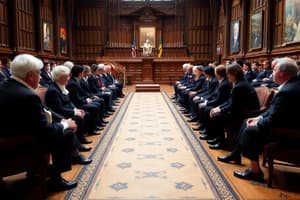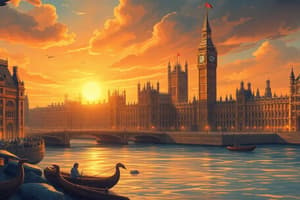Podcast
Questions and Answers
What is the primary reason for the devolution of powers in the UK?
What is the primary reason for the devolution of powers in the UK?
What was the outcome of the public votes held in Scotland, Wales, and Northern Ireland in 1997 and 1998?
What was the outcome of the public votes held in Scotland, Wales, and Northern Ireland in 1997 and 1998?
What is the term for the transfer of powers from the UK government to local bodies in each nation?
What is the term for the transfer of powers from the UK government to local bodies in each nation?
What are the elected groups in Cardiff, Belfast, and Edinburgh called?
What are the elected groups in Cardiff, Belfast, and Edinburgh called?
Signup and view all the answers
What is the name of the government based in London that was previously responsible for making decisions for the entire UK?
What is the name of the government based in London that was previously responsible for making decisions for the entire UK?
Signup and view all the answers
What is the main difference in power between the devolved nations and the UK government?
What is the main difference in power between the devolved nations and the UK government?
Signup and view all the answers
What is the term for powers that have not been transferred to the devolved nations?
What is the term for powers that have not been transferred to the devolved nations?
Signup and view all the answers
Which devolved nation has the most power?
Which devolved nation has the most power?
Signup and view all the answers
What is the name of the Welsh Parliament, as of May 2020?
What is the name of the Welsh Parliament, as of May 2020?
Signup and view all the answers
What was the significance of the 2014 Scottish referendum?
What was the significance of the 2014 Scottish referendum?
Signup and view all the answers
Study Notes
The United Kingdom and its Nations
- The UK is composed of four nations: England, Scotland, Wales, and Northern Ireland.
- There have been discussions about how these nations should be governed, with a growing desire for more control over local decisions.
Devolution
- Devolution occurred in the late 1990s, transferring powers from the UK government to local governments.
- Public votes were held in Scotland, Wales, and Northern Ireland in 1997 and 1998, resulting in the majority wanting more power.
- This led to the creation of the Scottish Parliament, National Assembly for Wales, and Northern Ireland Assembly, which have the power to make decisions on certain issues.
Powers of the Devolved Nations
- The devolved nations have control over issues such as education, housing, environment, and health.
- However, the powers of each nation are different and shared with the UK government in varying ways.
- Scotland has the most power among the devolved nations.
Reserved Powers
- Reserved powers include foreign affairs, defence, international relations, and economic policy.
- The UK government is responsible for making decisions on these national powers.
Scotland
- The Scottish Parliament is made up of 129 elected Members of the Scottish Parliament (MSPs) and sits at Holyrood in Edinburgh.
- The Scottish Government, led by the Scottish National Party (SNP) since 2007, is the executive branch responsible for running the parliament and creating/enforcing laws.
- The 2014 Scottish referendum led to a shift in power, with more powers being handed to the Scottish Parliament.
Wales
- The Senedd Cymru (Welsh Parliament) is made up of 60 elected Members of the Senedd (MS) and meets in Cardiff Bay.
- The Welsh government, led by the First Minister of Wales, has control over public services such as health, education, and local government.
- It also has the power to make laws relating to sport and recreation, tourism, town and country planning, flood defences, and the Welsh language.
Northern Ireland
- The Northern Ireland Assembly sits at Stormont in Belfast and has control over various issues.
- The Assembly was set up after the Good Friday Agreement (also known as the Belfast Agreement) to allow the people of Northern Ireland to run their own executive and pass laws.
Studying That Suits You
Use AI to generate personalized quizzes and flashcards to suit your learning preferences.
Description
Learn about the history of the UK government and the devolution of power to its four nations. Discover how the desire for more control and autonomy led to changes in governance. Test your knowledge of the UK's political structure and devolution process.



